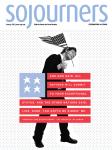Religious prejudice has become a major campaign issue during the Republican primaries this fall. Not surprisingly, it’s the “M” word. Surprisingly, the M word in question is not “Muslim.” While Newt Gingrich and Herman Cain have both made remarks about the alleged dangers of sharia law in American courts, the M word making the most waves is “Mormon.” The issue is this: Will a key Republican voting bloc—conservative evangelical Christians—refuse to support the likely front-runner, Mitt Romney, a Mormon?
The biggest wave thus far was caused by Robert Jeffress, who introduced presidential hopeful Rick Perry at the Values Voter Summit in October and then made the rounds of reporters declaring Mitt Romney’s religion a “cult” and saying “born-again followers of Christ should always prefer [a] competent Christian to a competent non-Christian like Mitt Romney.”
Watching the news coverage of this incident, I’ve been struck by two things. One, for the most part, the tone that the media appears to be taking regarding an issue of blatant religious prejudice is what I would call “descriptive/inquisitive.”
Cable news anchors ask questions such as, “Do you think Romney’s religion is going to cost him the election?” Replace the term “religion” with “economic plan,” and the tone would be the same. Now imagine if we replace Romney’s “religion” with Romney’s “race” or “gender.” The tone changes—it goes from descriptive/inquisitive to offended and outraged—and it should. That’s because our society has, again for the most part, recognized that counting someone’s race against her in a political election is an act of prejudice, and it’s bad. So why is counting someone’s religion against him any less an act of prejudice? Why has our media become enlightened enough to call out racism or sexism in political races, but when it comes to religious prejudice, the tone is, “Gee, look at that. Wonder how that faith is going to play?”
Here’s the second thing I’ve been thinking about. After the crazed discourse around Cordoba House (popularly known as the “Ground Zero mosque”) in the 2010 congressional elections, I was bracing myself for a full-on assault on Muslims in the lead-up to 2012. So I am relieved that doesn’t appear to be happening, at least at this stage. But I really shouldn’t be. Just because my faith isn’t being attacked in public doesn’t mean that I should sit back and rest. The fact that it’s someone else’s faith being attacked implicates me just as strongly.
When I was in high school, I watched a Jewish friend of mine wither under a steady stream of anti-Semitic insults. I watched in silence. A few years later, my friend raised the issue with me. It was not the stones thrown by his tormentors that made him suffer most, he said; it was the silence of his friends. Having him look me in the eye and say that remains the single most humiliating experience of my life. When I shared the experience with my father, he responded with deep disappointment. “You didn’t just fail your friend,” he told me, “you failed your faith. You didn’t live up to what it means to be a Muslim.”
My faith teaches me to stand up for those who are suffering, especially if they don’t share my faith. It is what Muslim heroes from the Prophet Muhammad to Badshah Khan did. It’s what the heroes of all faiths do—I think of what people such as Jim Wallis, Brian McLaren, Skye Jethani, Bob Roberts, and Rich Cizik did for Muslims around the Ground Zero mosque debate in America, or what Bonhoeffer did for Jews in Nazi Germany.
Many in the media are asking, “Are Mormons Christians?” An interesting and important question, no doubt. But it has no relevance to our politics or public life. Here’s the question that matters: Are people who claim to be Christian going to act like Christians? Same with Muslims, Jews, Hindus, and humanists. In all of our traditions, standing up for those who suffer prejudice because of their faith or tradition is part of what it means to be who we say we are.
Eboo Patel is founder of the Interfaith Youth Core and author of Acts of Faith: The Story of an American Muslim, the Struggle for the Soul of a Generation.

Got something to say about what you're reading? We value your feedback!